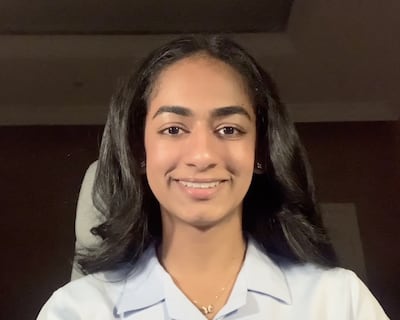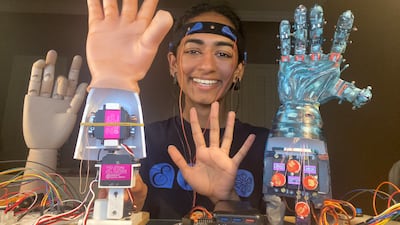An enterprising teenager in Dubai has won international recognition after being inspired by brotherly love to develop cutting-edge prosthetic hands to empower people with disabilities.
Maha Nawaz, 17, a Pakistani pupil at Dubai College, is among ten finalists vying for the $100,000 Chegg.org Global Student Prize 2024.
The award, now in its fourth year, highlights the work of exceptional pupils and students making an impact on learning and the world.
She said caring for her brother, who has autism, had fuelled her desire to improve the lives of people with disabilities.
The pupil has created two prototypes for prosthetic hands that can carry out a variety of actions, such as picking up a cup or shaking someone’s hand, using signals transmitted directly from the brain.
“In supporting my special needs brother, who is mute, has autism and is epileptic, it can be very difficult to communicate and understand his needs,” said Maha.
“I've always been very curious and inquisitive about understanding the brain in order to help him. As a result, I've developed a passion to understand the brain through engineering, machine learning and brain computer interfaces.
Passion project
“As a high school pupil, I built an ultra-low cost mind control prosthetic that can pick up a cup without the need to move a muscle.
“That was just my first spark ... I want to do this for the rest of my life, because I have a passion for this, and I want to pursue this to empower people like my brother.”

The pupil has just finished designing and manufacturing a prosthetic controlled through residual muscle contractions costing under $100, rivalling commercial solutions that cost tens of thousands of dollars.
She is also collaborating with New York University Abu Dhabi to create an eye movement robotic arm for patients who have very limited communication. The eye movement is detected via brain waves.
“My mission is to empower people with mental or physical disabilities through the use of technology and engineering,” she said.
“In the future, I hope to create BCI (brain-computer interfaces) that can process or translate thought into speech. That way my brother, who is mute, will finally be able to speak.
"Now, I know that's a pipeline dream, but I'm willing to dedicate my life to the cause,” she said.
A brain-computer interface is a direct communication link between the brain's electrical activity and an external device, for example a robotic limb.
She said she aims to ensure technology is widely accessible to anyone who needs it.
Her efforts extend to her native Pakistan, where she has founded a non-governmental organisation (NGO) called SheMakes that provides robotics kits for underprivileged girls which help to educate them about engineering, electronics and mathematics.
The organisation is also working to improve healthcare in rural villages through a remote patient monitoring system.
She has provided workshops and robotics kits for more than 600 underprivileged children so far, and is eager to do more to help those less fortunate.
If she wins the Global Student Prize, she intends to use the money to expand her non-profit, create more robotics kits for underprivileged children and provide opportunities for pupils to get into science, technology, engineering and mathematics (Stem fields).
“I would also like to create an improved prototype of my different prosthetics in order to help a larger community of people and perhaps commercialise it one day, such that it is widely accessible to anyone who needs it," she said.
Chegg.org partnered with The Varkey Foundation to launch the annual Global Student Prize in 2021, a sister award to its $1 million Global Teacher Prize.
The prize is open to all pupils 16 and above and college students enrolled in an academic institution or training programme. Part-time students, as well as students enrolled in online courses, can also apply.
Heather Hatlo Porter, Chegg’s chief communications officer, said: “Through the Global Student Prize, we shine a spotlight on inspiring students from around the world, giving them an opportunity to share their stories, connect with one another, and have their voices heard.
"Now, more than ever, students like Maha deserve recognition, as their dreams, creativity, and remarkable endeavours are essential to tackling the urgent challenges facing our world.”
Sunny Varkey, founder of the Varkey Foundation, said: “Maha’s story serves as a powerful reminder of the pivotal role that education plays in shaping a better world for everyone”
The winner is expected to be announced in New York later this month, during UN General Assembly week, and will be chosen from the top 10 finalists by the Global Student Prize Academy, made up of prominent individuals.
Students are being assessed on their academic achievement, impact on their peers, how they make a difference in their community and beyond, how they overcome the odds to achieve, how they demonstrate creativity and innovation, and how they operate as global citizens.


